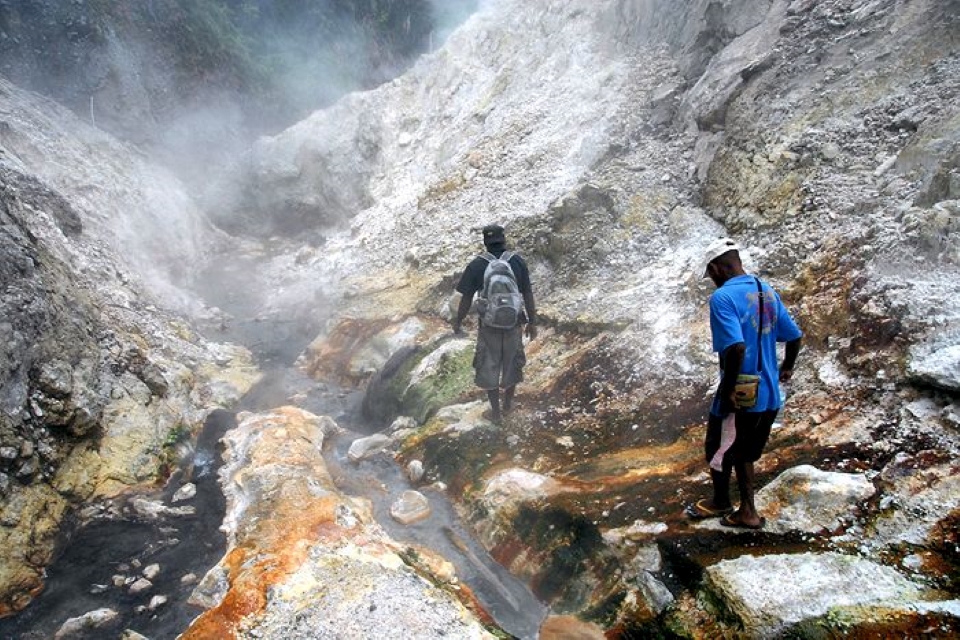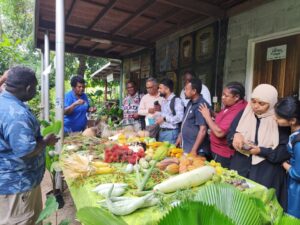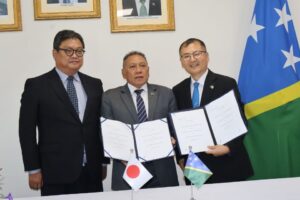THE Permanent Secretary (PS) of the Ministry of Environment, Climate Change, Disaster Management and Meteorology, and the Chairman of the National Disaster Council (NDC), Dr. Melchior Mataki reiterated the critical importance of reviewing the 1975 Savo Evacuation Plan to develop an updated Savo Emergency and Disaster Management Plan.
Addressing participants at closing of the two days Provincial and Community consultative workshop on 27th October 2022, PS Mataki acknowledged the participants for their inputs and contributions as highlighted by the commitment they have shown over the two days and the depth of their suggestions and proposals to review the Savo Evacuation Plan and the subsequent development of the Savo Emergency and Disaster Management Plan.
The discussions included the participants’ concerns regarding the limited implementation of the previous plan, experiences of participants during the seismic volcanic activities of 2021to inform early warning processes, the response measures in the event of an eruption including evacuation and potential relocation to other parts of the Central Province. In this connection, participants reiterated their call to the Central Provincial Government and the National Government to secure land that is under the purview of the Provincial Government to address the impact of human population displacement in the event where the Savo volcano erupts, and this process should be initiated sooner than later.
The NDC Chair acknowledged the participants in seeing it fit to ensure that the plan must be inclusive by highlighting the issues on safeguarding the most vulnerable group of people such as the elderly, sick, disable, very young, and women and girls are being considered in the planning process and the plan.
PS Dr. Mataki further stated that even though the review of the 1975 plan has taken 46 years to be put it back on the table to be reviewed, it is better late than never. The Chairman of the NDC further elaborated that this consultative workshop is an important process in revisiting the 1975 plan to develop a new plan that is current, simple and practical, which will set out the arrangements that would organise our actions as per the four phases of the plan, which includes, Phase 1, Preparedness (Peace time work), Phase 2, Alert and Warnings, Phase 3, Response and Phase 4, Early Recovery. Dr. Mataki then reiterate that the all these phases are interconnected and is a cycle. While they are being discussed independently of each other, they are actually connected to each other, stating that whatever actions taken on the first phase will have an impact on the subsequent phases.
Dr. Mataki also highlighted that the identification of the roles and responsibilities of the community, the Province and the National Government in the plan shows the importance of the need to collaborate to address the risks posed by Savo volcano. Unlike tropical cyclones which are seasonal, and their threats only exist during the cyclone season from November to April, Savo volcano is an on-going geo-hazard. As such, reviewing the Savo Evacuation Plan of 1975 towards the development of a new plan through a consultative process is an important first step.
PS Mataki reiterated that the work done for the Savo volcano is of national importance and need, because any volcanic eruption on Savo will affect the whole of Solomon Islands. Honiara being the seat of government, commercial hub and host of a large population is located only 35 kilometers from Savo, the rest of Central Province, Guadalcanal, Isabel and Malaita provinces are also not far from Savo. This is also another important reason for us to revisit the 1975 Savo volcano plan and update it.
Taking this forward, the Chairman of the NDC stated that the NDC through the technical agencies and the NDMO is pressing to have revised zero draft of the new Savo Emergency and Disaster Management Plan by the end of this year, and the plan will then be presented back to the communities on Savo and as well as to the Central Provincial Government through the Provincial Disaster Committee (PDC) and the Provincial Disaster Operations Committee (P-DOC) within the first half of 2023.
The PS MECDM and Chairman of the NDC also acknowledged and thanked the technical experts from the Geological Survey Division of the Ministry of Mines Energy and Rural Electrification, Solomon Islands Meteorological Services, Royal Solomon Islands Police Force, the National Disaster Management Office, representatives from the twelve communities on Savo, Nagotano and the representatives from the Central Islands Provincial Government for their participation. Dr. Mataki also acknowledged with appreciation the Chiefs and community of Nagotano Island for their hospitality and for allowing the workshop to be hosted on the Island.
Source: National Disaster Management Office




